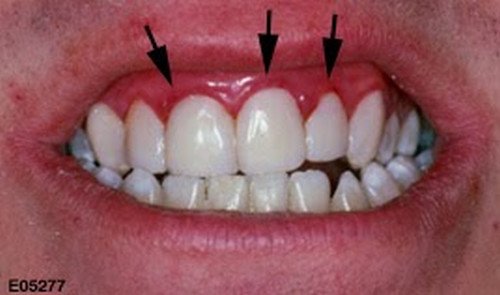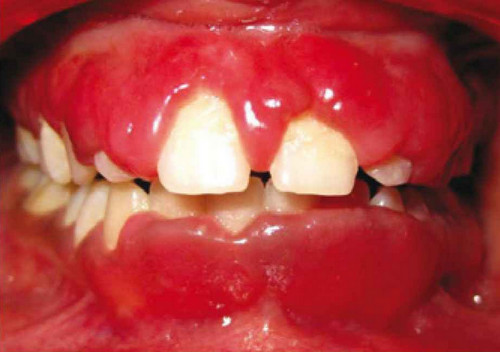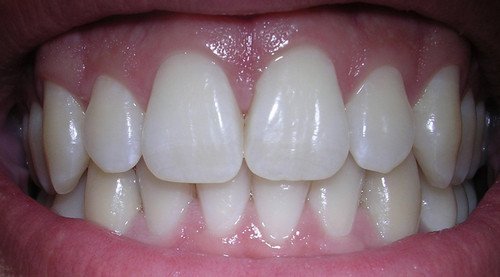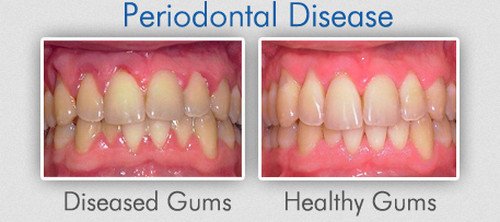Swollen Gums
Last reviewed by Dr. Raj MD on January 12th, 2022.
When it comes to dental health, the primary focus is always on the teeth. Only a few people know the importance of taking good care of the gums.
The gum is the soft tissue in the mouth covering the bone that holds the teeth in place. It surrounds the teeth and covers the jaw bone thereby providing a protective barrier. The gum is medically called gingiva. The gums play an important role not only in your dental health but in your overall health and well-being.
A swollen gums is a common problem. Swelling and bleeding are signs of gum-related disease.
Causes of swollen gums

Image 1: A closer look on the oral cavity of a patient with a mild swelling of the gums.
Picture Source: 3.bp.blogspot.com

Photo 2: A severe swelling of the gums.
Image Source: naturalhealthbag.com

Image 3: An image of a normal healthy gums.
Picture Source: bromsgrovedental.co.uk

Photo 4: A comparison image of a healthy gum and a gum with periodontal disease.
Image Source: worlddental.ca
Excessive brushing/wrong brushing technique
Everybody wants to have shiny and sparkling teeth. To achieve this, we tend to brush as vigorously as we can. We forgot to consider that the gums are made of sensitive tissues. Excessive brushing and brushing the wrong way could damage the gums. They can make the gums red and swollen. (3)
Wrong flossing technique
Flossing is necessary to get rid of plaque from places that cannot be thoroughly cleaned by a toothbrush. However, wrong flossing technique increases the possibility of swelling and painful gums. It is important to be very gentle when flossing the teeth. (4)
Gum disease/Periodontal disease
This is the most common cause of swollen gums. Many people have gingivitis (less severe form of gum disease). However, there are also reported cases of severe gum disease such as periodontitis. Gum disease is a result of poor dental hygiene.
The bacteria in the mouth form plaque on the teeth causing inflammation and swelling of the gums. Once you have gingivitis, you need to treat it the earliest possible time. If you left it untreated for a long period of time, it could lead to a more serious condition.
It could even cause your teeth. You should immediately seek medical help if you notice any of the following:
- Swollen gums in back of mouth (5)
- Swollen gums around one tooth
- Formation of deep pockets between the teeth and gum
- Bleeding gums, especially during and after brushing
- Shifting teeth/loose teeth (6)
- Persistent bad breath (halitosis)
- Pain, redness, and inflammation of the gums
- Receding gums (4)
Canker Sores
A painful gums can be linked with canker sores. Mouth ulcers are common and can develop anywhere in the mouth such as the soft tissues in the mouth, tongue, and gums. You could have one canker sore or multiple canker sores at a time.
Side effects of chemotherapy
Chemotherapy causes painful, swollen, and bleeding gums. Those who are battling with cancer usually have stomatitis, which leads to sores and ulceration in the mouth and gums. (6, 7)
Excessive use of tobacco products
Excessive used of cigarettes and other tobacco products can damage the gums. Chain smokers are more likely to develop gum-related diseases. (3)
Hormonal changes
Changes in the hormone level causes a variety of symptoms and one of which is gum-related problem. It could happen during puberty, menstruation, pregnancy, and menopause. Swollen gums during pregnancy are common.
The condition is called pregnancy gingivitis, which usually occurs during second to third trimester of pregnancy. The gums swell and bleed. (7)
Nutritional Deficiency
The body needs essential vitamins and minerals for it to function in its optimum potential. Vitamins and nutrients are called micronutrients and they play a very important role in preventing various types of diseases and illnesses.
The body does not produce micronutrients and so you need to supplement it from your diet. Micronutrient deficiency could make you prone to various diseases and illnesses including swollen gums. (5, 8)
Sensitivity to toothpaste/mouthwash
There are a variety of oral care products in the market. Some of them contains strong chemicals that can irritate the oral cavity.
Some could even cause swelling and bleeding of the gums. As much as possible, you should choose oral care products made from safe and natural ingredients to prevent irritation. (1, 2, 3)
How to treat swollen gums?
If you have swollen gums, the best remedy is to get rid of the plaque and tartar build up. The dentist will also recommend regular dental cleaning, scaling, and root planing to stop the progression of gingivitis.
If the cause of swollen gums is advanced form of periodontal disease, the dentist will perform continuous treatment for swollen and bleeding gums. (8)
How to get rid of swollen gums : Home remedies
Mild gum swelling and bleeding can be treated right in the comfort of home. The recommended natural treatment for swollen gums include the following:
- Warm and cold compress – alternate hot and cold compress provides quick relief from swollen gums. They can significantly reduce the pain and swelling. However, you shouldn’t directly put hot and cold compress on the gums. You should put it against your face.
- Salt water – Salt has a healing benefit for swollen gums. It can inhibit the growth of bacteria-causing disease in the mouth and prevents the progression of infection.
- Hydrogen Peroxide – This powerful solution is proven effective in reducing pain and inflammation of the gums. In fact, it helps get rid of germs and fight various forms of oral problems. Make sure you use food grade 3% hydrogen peroxide solution.
- Turmeric – It is tested and proven effective in the treatment of swollen gums. The powerful ingredient is curcumin, a substance rich in antioxidant and anti-inflammatory property. Turmeric can help alleviate pain, reduce swelling and inflammation. (9, 10, 11)
How to prevent swollen gums?
- Make it a habit to brush your teeth regularly. Dental health experts recommended brushing at least two to three times a day using the proper brushing technique.
- Include flossing in your day to day oral health habit.
- It would help a lot if you are going to rinse with mouthwash to kill bacteria that cause gum-related diseases.
- Eat a well-balanced diet. Increase your intake of micronutrients so as to prevent the likelihood of contacting gum-related diseases.
- It is important to keep the body well hydrated. Drink plenty of water and natural fruit juices.
- Stay away from bad vices such as excessive tobacco and cigarette use.
- You should avoid things that can irritate the gums such as strong mouthwash and alcoholic beverages.
- Avoid stress. It raises the level of cortisol, a substance responsible for inflammatory responses of the body. Stress is not only bad for your gums, but for your overall health too. (2, 6, 8, 12)
References:
- https://www.1800dentist.com/swollen-gums/
- https://www.healthline.com/symptom/swollen-gums
- http://www.colgate.com/en/us/oc/oral-health/life-stages/adult-oral-care/article/how-to-treat-swollen-gums-that-aren-t-bleeding-1015
- http://www.stylecraze.com/articles/simple-home-remedies-for-swollen-gums/
- http://www.top10homeremedies.com/home-remedies/home-remedies-to-reduce-gum-swelling.html
- https://www.fastmed.com/health-resources/swollen-gums-treatment/
- http://health.howstuffworks.com/wellness/oral-care/products/home-remedy-for-swollen-gums.htm
- https://www.webmd.com/oral-health/guide/gum-problem-basics-sore-swollen-and-bleeding-gums#1
- http://www.rapidhomeremedies.com/home-remedies-for-swollen-gums.html
- http://www.personalcaredentistry.com/10-causes-of-swollen-gums/
- https://www.corsodyl.co.uk/gum-disease/symptoms/swollen-gums/
- https://oxyfresh.com/6-ways-care-swollen-bleeding-gums/